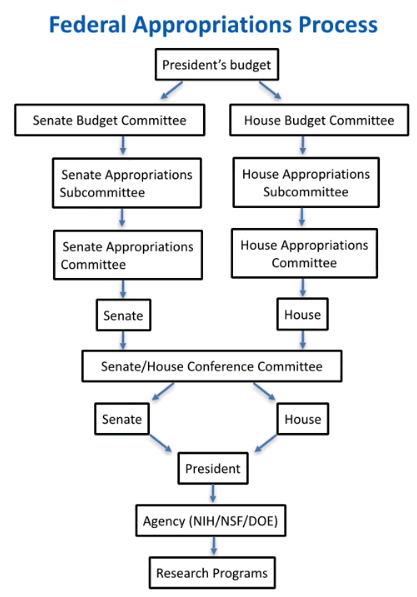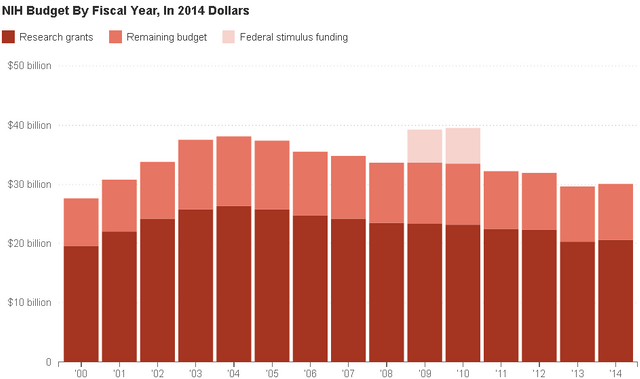 source [Normal procedure for budget definition hierarchy]
source [Normal procedure for budget definition hierarchy]Some money comes form private institutions, perhaps the best example of this has been Bell Labs that gave us such advancements as the transistor, but the vast majority comes from gubernamental organizations.
The NIH funds provides almost 2/3 of all research that flows to universities. Whose budget adjusted to inflation depended on sustained uncontrolled growth in order to keep filled the continuously growing positions at universities.
[6]
[Figures for 2014 are preliminary. Figures for 2000-2013 have been adjusted for inflation using the Biomedical Research and Development Price Index. Federal stimulus funds in 2009-2010 came from the American Recovery and Reinvestment Act of 2009.NPR analysis of NIH data; NIH (PDF: 2000-2013, 2014); recovery.nih.gov]
This science budget has many points of competition. First against civil groups (banks, churches, hospitals, labor unions...every social group you can think of). Later by particular organizations out of the branches of science.
Biomedical sciences have far stronger support than other areas of scientific research. Mainly due to the fact that voluntary organizations care deeply and passionately about research for diseases. They are usually conformed of patients and their family.
This is one of the reasons sporadic possible consequences for humans found during research are so interesting for researchers. Even if their research is not related to or intended humans at all, as is a big opportunity for funding.
Politics and passionate interest are a huge bottleneck for funding. This is problematic since even when there are scientific societies that advocate for public policy most of the time researchers remain on the sidelines.
Is almost infuriating as one would imagine science being generally a virtuous cause, more dependent on public funding and filled with highly educated people that could make a stronger case when compared to other interests (if one assumes that science stimulates long term the economy and benefits mankind).
Most scientists are not affiliated with a professional society with an advocacy program. Is a must. Public advocacy programs in most countries are a novelty for professional scientists. Being part of one means being active in it, which is now easier than ever thanks to social media.[7]
Transparency of local funding for grant applications and courtesy habits like a printed thank you letter to elected officials help, as is part of the social layer that is politics. Politicians tend to be poorly educated in the sciences and this is another part of science communication. One that is severely neglected.[8]
How grants work?
Most grants are of the focused research type. Someone submits a project and a limited funding is given for that project alone.


Very interesting.
I think that governments should more or less get out of the way of scientific research (Aka they should remove taxes and stuff like that). Research should be as stable as possible because its supposed to benefit a large section of mankind to actually be able to know and use the "products" of the research. It would also be better overall for governments to universally fund these research efforts.
Of course this also extends to things like the public and the media attention. What gets researched should not be subject to the media attention or the public interest but rather how important this research is to the scientific community.
I may be a programmer, but I also have a master's degree in chemical engineering and was planning to become a chemist before I ended up leaving college early. While I don't think academia was for me in the end, I still try to support it as much as possible. The things that I do in my job as a developer are directly effected by the research that is being done in these labs.
I think the problem lies with governments. Even with governments bubbles appear. When gates and finite resources appear people become cheaters. What is needed in my opinion and this would require testing is a system of funding exclusively for the most promising researchers and a system of absolute transparency for everyone else.
In the close future research could be more democratized thanks to programming but it would be more like reading or writing are taken for granted today. So interdisciplinary development is super important as is the future. Thanks for passing by and reading. :)
You have collected your daily Power Up! This post received an upvote worth of 0.35$.

Learn how to Power Up Smart here!
Isn't it better with bubbles? You gotta prove that stable growth is better. Maybe bubbles create things that otherwise you wouldn't have made.
Yes, but is a tax on the researchers. Bubbles are productive in research, as they are almost everywhere else. The real problem of railroad manias is that while they are great for building infrastructure, as the growth is not planned waste a huge portion of human capital when the bubble ends.
This is seen in deflationary systems and inflationary systems alike. When homeostasis breaks the whole system undergoes a shock, that in the economy is seen as Depression and in research is researchers abandoning academia.
Where has you been?, I missed your posts. Thanks for your writing!
Nowhere. I just took some time off due to a slight twitter adiction. But of course you already know that.
Because of human nature.
The economy is simply human activity.
And human activity often involves mania and irrational exuberance.
This is how bubbles happen.
A stable economy is an economy which is not free.
The problem with an economy that is not free is that it does not function as well as an economy that is free.
Therefore what we have is the worst system except for all the rest.
What we can do and what we do have power over is how intense the boom and bust cycle is. Are politicians doing enough to ensure that intensity is reduced, or too much to ensure that it is increased?
Well, that could be the case for normal economic activities. In the case of scientific research, which is what I'm interested, is affected by the economy but it produces results that are not economic in nature. Most big projects couldn't be organized without massive governmental funding. Darpa, Apollo missions, without patronage this probably wouldn't exist. It could change in the future but so far it doesn't seem feasible.
Interesting article. Every bubble brings innovation somehow though, it is part of the emotional human nature.
If you take your time to READ beyond the article's title you will find that is not about Bitcoin. Is about Biomedical research funding. Remove your spam or I'll flag you.
I did read the article, I was talking about bitcoin on purpose as it is considered to be a bubble in the making, to have a simple exchange of opinions in the comment section.
I could be wrong but is kind of odd that you comment Bitcoin in something that has marginally anything to do with the subject. I'm not fond of Finance talk in science unless it apports something interesting to the subject.
I normally ignore spam, but the effort in your comment was too big to ignore to almost completely dismiss the entire article. Could be your only point of interest in the article and that's fine yet I find it highly unlikely from my perspective, I could be wrong but that's the reason I have not flagged you yet.
To avoid any further misunderstanding, I'll do this out of game theoretical reasons. Last warning, remove or change your comments (to something about the subject of the article, even if disrespectful or contrarian) or I'll flag ALL your comments and posts from now on. 100% serious.
Sorry for a little off-topic question, what do you use for the text formatting?
The anecdote about the Newton - priceless...
I use a couple of tools:
Is a markdown editor that supports HTML. It shows coloring for code like python. It requires basic HTML knowledge.
Is a freeware tool that allows me to input prewritten HTML commands with quick access buttons.
Both platforms where I can convert videos into .gif edit them only and even combine them.
Just as it says.
For modifiable images that hold mathematical equations.
I'll make a detailed post about this in the close future.
great information
Really nice and interesting topic
I like your science post.
That's what's up.